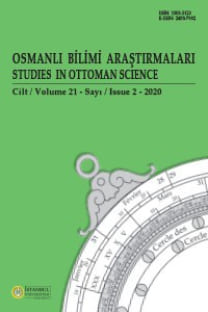Osmanlı İmparatorluğu’nda Afyonun Tarihi
Haşhaş bitkisi, (Papaver somniferum) Anadoluda MÖ 2000’den beri yetişmektedir. Hattuşa’da bulunan kil tabletler, haşhaş ve afyon üretimi hakkında ayrıntılı bilgi içerir. P. Belon (1517-1564), J. P. De Tournefort (1656- 1708) ve G.A. Olivier (1756-1814) gibi Avrupalı gezginler, Osmanlı İmparatorluğu’nde afyon üretimini seyahatnamelerinde anlatmaktadırlar. Yüksek kalitede morfin içeren Türk afyonu, Avrupa’da en iyi afyon olarak bilinirdi. Bu afyon, Avrupa sergilerinde Osmanlı eczacıları Francesco della Sudda (1814-1866) and Giorgio della Sudda (Fayk Bey, 1835-1913) tarafından sergilenmiş ve ödüllendirilmiştir. G. Della Sudda, 1867 Paris Sergisi’ne afyon örneklerinden oluşan bir koleksiyon ile katılmış ve bu münasebetle Monographie des Opiums de l'Empire Ottoman Envoyés à l'Exposition Universelle de Paris adlı bir yayın yapmıştır.
Anahtar Kelimeler:
Afyon, Giorgio Della Sudda, haşhaş, Papaver somniferum, Paris Sergisi (1867), Türk afyonu
Opium in the Ottoman Empire: Historical Notes
Opium poppy (Papaver somniferum) has been cultivated in Anatolia since 2000 BCE. The clay tablets discovered in Hattusha, the capital of the Hittite Empire, give rather detailed information on the opium poppy and the opium production. In their itineraries, European travellers such as P. Belon (1517-1564), J. P. De Tournefort (1656-1708) and G.A. Olivier (1756-1814) relate the production of opium, and its use in the Ottoman Empire. The Turkish opium containing high quantity morphine, was regarded in Europe as the best quality of opium. Ottoman drugs were displayed in European exhibitions by the Ottoman pharmacists Francesco Della Sudda (1814-1866) and Giorgio Della Sudda (Fayk Bey, 1835-1913), where they were rewarded. G. Della Sudda took a collection of opium specimens to the 1867 Paris Exhibition, and also published a booklet on the opium production and trade in the Ottoman Empire on the occasion: Monographie des Opiums de l'Empire Ottoman Envoyés à l'Exposition Universelle de Paris.
Keywords:
Giorgio Della Sudda, opium, opium poppy, Papaver somniferum, Paris Exhibition of 1867, Turkish opium,
___
- -
- ISSN: 1303-3123
- Yayın Aralığı: Yılda 2 Sayı
- Başlangıç: 1995
- Yayıncı: İstanbul Üniversitesi Edebiyat Fakültesi
Sayıdaki Diğer Makaleler
Şehremini Merkez Eczanesi’nin Reçete Kayıt Defteri
Bunsen beki ve spektral analizin doğuşu ve Türkiye’de tanıtılması
Osmanlı eczacılığında bir kilometre taşı: İngiliz Eczanesi, İstanbul
Mekteb-i Tıbbiye-i Şahane’nin 1870’li yılların başındaki doğa tarihi koleksiyonu
İstanbul Üniversitesi’nde Eskilerden Bildiklerim, Hatırladıklarım
Hüsnü Demiriz (1920-1999) ve Türkiye Bitkileri Koleksiyonu
